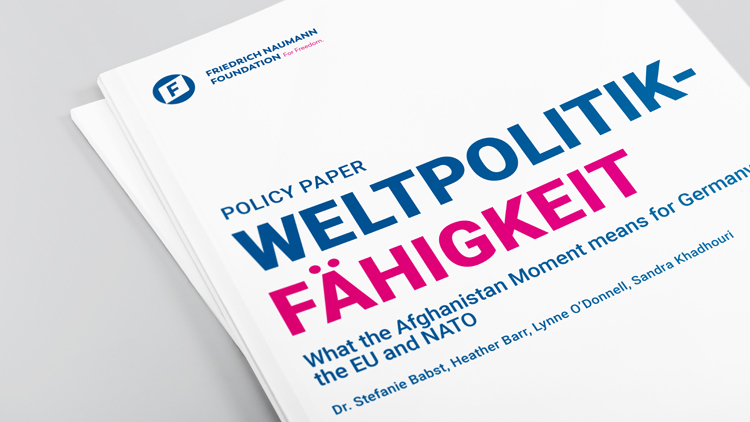Policy Paper
What the Afghanistan moment means for Germany, the EU and NATO

The international community is drawing up the balance of twenty years of the Global War on Terror. Terrorism has not been defeated and liberal democratic values have not taken hold in the Hindu Kush, let alone been perpetuated. The Western alliance has failed to build lasting peace in Afghanistan and to support a free and secure future for the Afghans.
In the face of constantly revolving politics and rapidly changing world events, there is a real threat that the war in Afghanistan is quietly written off and disappears from the international agenda. At the moment of writing, attention is already turning towards the Indo-Pacific, where the new AUKUS trilateral security partnership has caused a rift between NATO members the likes of which has rarely been seen before. However, losing focus on Afghanistan would add insult to injury to the strategic failure that has plunged the country back into chaos. On top of that, it could lead us to underestimate the resulting security threats that will affect the entire region, if not the rest of the world. And finally, a profound opportunity for strategic learning would be missed.
The departure of the last Western troops from Afghanistan marked the end of America‘s longest ever war and one of the longest running NATO missions in history. It is estimated that between 1 to 2.6 trillion dollar was spent on the war and reconstruction projects. Even more confronting are the human costs. NATO lost 3.592 troops, the Afghan national military and police had 66.000 casualties and more than 47.000 Afghan civilians lost their lives in the conflict. Despite enormous investments and even greater losses, we are now faced with the very real question: what has been achieved and what can be learned?
The Western alliance has a responsibility to thoroughly review its engagement in Afghanistan. The different stages of the war need critical assessment, as well as the factors that led to the instant collapse of the fragile state. As indicated by the title of this publication, Weltpolitikfähigkeit, the West needs to analyse its capacity to play a role in shaping global affairs. For Germany, the EU and NATO this means clearly defining a strategic outlook and objectives, and the means to achieve them. Only an honest and frank assessment can ensure that the lessons learned from Afghanistan can contribute to Europe‘s future ability to act on the world stage.
This impulse paper deliberately presents different perspectives on Afghanistan, Western engagement, and future scenarios. All contributions should be considered independently; the each represent their own views. Our aim is to stimulate reflection, provide food for thought and point to concrete recommendations for action. The dialogue on Weltpolitikfähigkeit will continue to occupy us.
The Western alliance needs to assume responsibility, honestly address failures, and develop new strategic goals and means to ensure that the Afghanistan scenario is not repeated. The results of the twenty-year mission currently paint a dire picture. It is up to the Western community to contain the humanitarian disaster that is unfolding and to collect the scraps of progress so that can they contribute to a better future.
